ARTICLE AD BOX

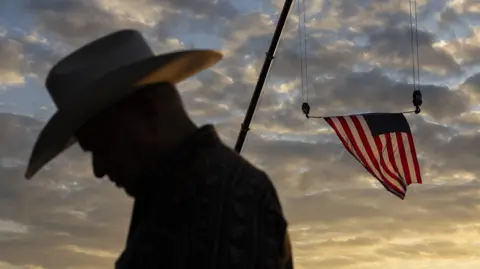 Getty Images
Getty Images
America is choosing its path forward, and the stakes could not be higher.
Both candidates have presented stark visions for the future if they lose this election. Donald Trump says the country will "go to hell" and become "communist immediately" if he loses, while Kamala Harris describes her opponent as a "fascist" who wants "unchecked power".
Voters in the key battleground states have been bombarded by campaign ads, much of it designed to induce fear. Given this climate, it is no wonder surveyed Americans are reporting high levels of anxiety.
"I do believe they're making us live in fear just to get our vote," Heather Soucek told me in Wisconsin as election day loomed. She lives in a swing county in a swing state, and plans to back Trump because, in her words, Harris's economic plans are "scary".
But just along the street, I also met Tracy Andropolis, a registered independent who said she would vote for Harris. "It's one of the most important elections in my lifetime. There's a lot on the line," she said, adding that she was concerned Trump would refuse to give up power if he won.
Both expressed genuine fears for the future if their candidate lost, reflecting the existential mood of many voters on the eve of the election.
Ms Andropolis also told me she did not believe the neck-and-neck polls. Not because she has any real evidence, but because she cannot envisage millions of people planning to vote for Trump. And she is by no means alone in her struggles to accept the closeness of this race.
One of the things I've learned travelling around this country and talking to voters is that America doesn't just seem remarkably divided, it feels as though two separate nations are awkwardly cohabiting on the same land mass.

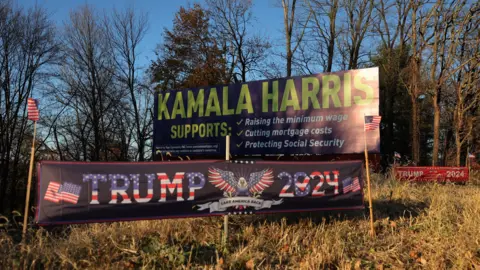 Getty Images
Getty Images
Democrats mainly live in the cities and suburbs, with Republicans mostly living in rural areas. Americans are increasingly moving to places where their neighbours share their political outlook. And it’s not hard to identify these areas at the moment, given the yard signs and placards that so often mark out Trump and Harris territory.
But it is not possible to live in these separate political worlds forever. These two sides are about to collide with the harsh reality of an election.
However disputed, however contested, there has to be a winner.
And when some here learn the eventual result and realise that tens of millions of their fellow Americans feel very differently to them, it will be a shock.
US voters: My biggest fear if the other side wins
Both Trump and Harris have charted their own historic and tumultuous paths to polling day.
I was among the press pack gathered outside a Manhattan court to witness Trump's arraignment in his criminal hush-money trial in April. He was found guilty weeks later, becoming the first former or sitting president to be convicted of a crime. Many asked at the time: could a convicted felon really reclaim the White House?
But his legal troubles and his claim that he was being deliberately targeted by the Biden administration only fuelled his campaign and fired up his supporters. "They're not after me, they're after you," he would so often say.
"They're weaponising the criminal justice system against their political enemies, and it's not right," one of his supporters told me outside the courthouse. "I will fight for this man until the day I die," another said.
A familiar pattern emerged: with each indictment, his poll ratings climbed and financial donations poured in.
Just think back to the moment last year when his mugshot was taken as part of the election interference case in Georgia. It quickly became an iconic image that now adorns many of the T-shirts I see at Trump rallies.

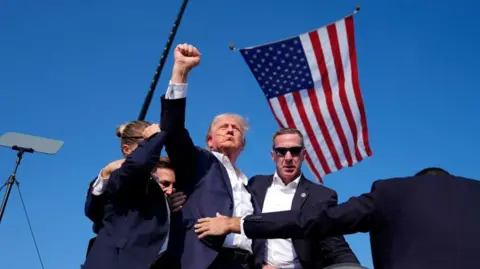 Evan Vucci/AP
Evan Vucci/AP
Trump shortly after a gunman shot at him in Butler, Pennsylvania.
And it is impossible to recount the former president's wild ride to polling day without the moment that produced another iconic image and almost ended the contest altogether.
When Trump was shot by a would-be assassin in Butler, Pennsylvania, in July, it shook this race and this nation profoundly. As he was helped to his feet by Secret Service agents, blood pouring from his ear, he raised his fist in the air and urged his supporters to fight.
When he appeared just 48 hours later at his party's convention in Milwaukee with gauze over his ear, some in the crowd were weeping. I could see tears rolling down the face of one delegate standing near to me. It was Tina Ioane, who'd travelled from American Samoa.
"He is the anointed," she told me. "He was called to lead our nation."
At that stage in the summer, electorally, Trump looked unassailable.
On the other side, Democrats were becoming increasingly depressed about their own prospects. Deeply anxious that their candidate, Joe Biden, was too old to win re-election.
I was in the press room watching his shambolic debate against Trump in late June. There was stunned silence as we watched Biden's 50-year career in politics essentially come to an end in front of our eyes.
But even then, many who publicly suggested he should step aside were dismissed. The Biden campaign even hit out at the "bedwetting brigade" who were calling for him to go.
It would, of course, be a matter of time.
Just days after that jubilant Republican convention in July, when Trump looked like he could not lose, Biden announced he was giving up his re-election bid. The mood among Democratic supporters soon swung from anxious pessimism to excited anticipation.
Any reservations they had about whether Kamala Harris was their best candidate were erased at a joyful convention in Chicago a few weeks later. People who had been resigned to defeat were now swept away on a tide of enthusiasm.
This election represented a chance to "move past the bitterness, cynicism and divisive battles of the past", she said to loud cheers.
But this burst of excitement did not last. After an initial bump in the polls, Harris struggled to maintain the momentum. It appears she quickly won back traditional Democrats who were not backing Biden but found it harder to win over crucial undecided voters.

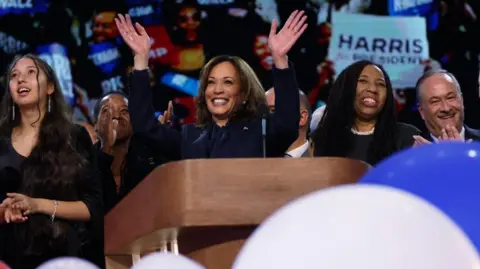 Reuters
Reuters
Kamala Harris gave the Democratic party a new sense of enthusiasm.
Harris, however, has repeatedly pushed that more optimistic message. She has also made reproductive rights a cornerstone of her campaign, and is hoping the issue will motivate women to turn out in high numbers.
But the challenge, as in all presidential elections, is to convince the undecided.
I met Zoie Cheneau at a hair salon she owns in Atlanta, Georgia, less than two weeks out from the election. She said she had never been so unmotivated to vote.
"It's the lesser of two evils for me right now," she said, explaining that she would ultimately cast her ballot for Harris but felt Trump may prove better for small businesses.
"I will be excited that a black woman would be the president of the United States," she said. "And she will win, I know she will win."
Two tribes face crunch moment
While some voters are anxious and believe this race to be close, Ms Cheneau's certainty about the eventual result is something supporters on both sides repeatedly express.
Many Harris supporters simply cannot understand why she is not further ahead of a convicted criminal who has been publicly attacked and derided by those who served in his last administration.
Trump supporters are equally aghast that anyone could vote for a candidate who has flip-flopped on policy and has been in the White House at a time when illegal border crossings reached record levels.
These two tribes exist in what appear to be parallel political ecosystems, across a deep partisan divide where opposing views are dismissed and the candidates inspire a devoted loyalty that goes beyond normal party affiliation.
Voters have been given apocalpyptic warnings about what might happen if the other side wins. They've been told this election is about far more than who sits in the Oval Office for the next four years. Many believe it is an existential event that could have disastrous consequences.
There is no doubt the tone of this campaign has raised the stakes, ratcheting up anxiety and tension, meaning the aftermath of this election could be explosive. We are expecting legal challenges and street protests would be a surprise to no one.
This is a nation split between opposing visions of what's at stake. But it is in the polling stations that Red and Blue America will meet and be counted.
Whatever the result, roughly one half of the country is about to discover that the other half has a completely different sense of what America requires.
For the losers, this will be a stinging realisation.



 2 months ago
12
2 months ago
12
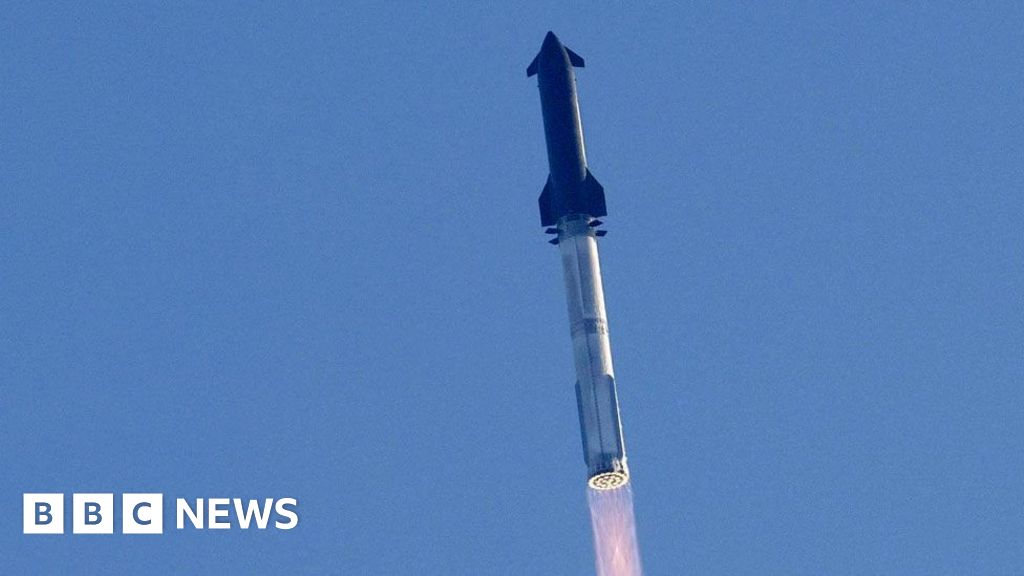
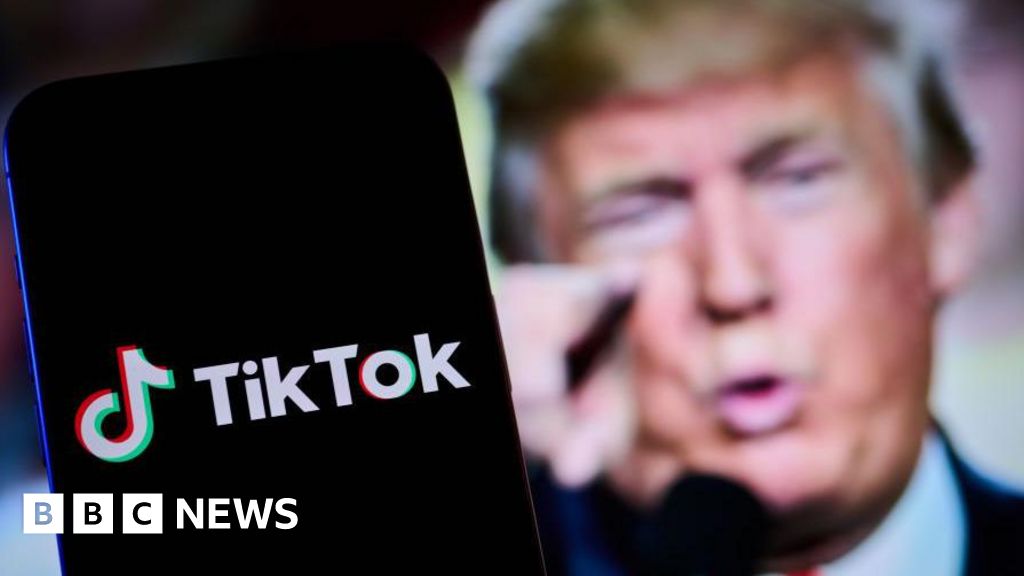
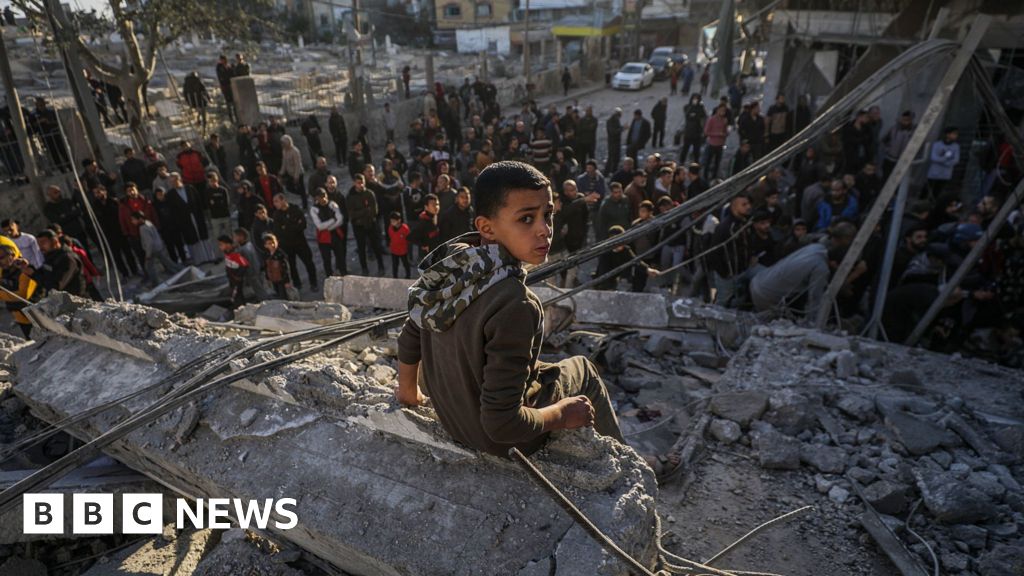





 English (US) ·
English (US) ·